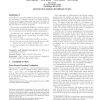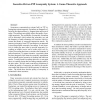1653 search results - page 146 / 331 » Computer science and game theory |
107
Voted
STACS
2001
Springer
15 years 5 months ago
2001
Springer
In 1974 R. Fagin proved that properties of structures which are in NP are exactly the same as those expressible by existential second order sentences, that is sentences of the form...
PODC
2004
ACM
15 years 6 months ago
2004
ACM
Secure function evaluation (SFE) enables a group of players, by themselves, to evaluate a function on private inputs as securely as if a trusted third party had done it for them. ...
113
click to vote
ICPP
2007
IEEE
15 years 7 months ago
2007
IEEE
– Anonymous communication systems built on P2P infrastructures using anonymity forwarders are frequently affected by the churn problem, i.e. frequent joins and leaves of nodes. T...
112
Voted
ECTEL
2009
Springer
2009
Springer
The Influence of Coalition Formation on Idea Selection in Dispersed Teams: A Game Theoretic Approach
15 years 4 months ago
In an open innovation environment, organizational learning takes place by means of dispersed teams which expand their knowledge through collaborative idea generation. Research is o...
100
click to vote
ICALP
2007
Springer
15 years 7 months ago
2007
Springer
Valiant’s theory of holographic algorithms is a novel methodology to achieve exponential speedups in computation. A fundamental parameter in holographic algorithms is the dimens...


